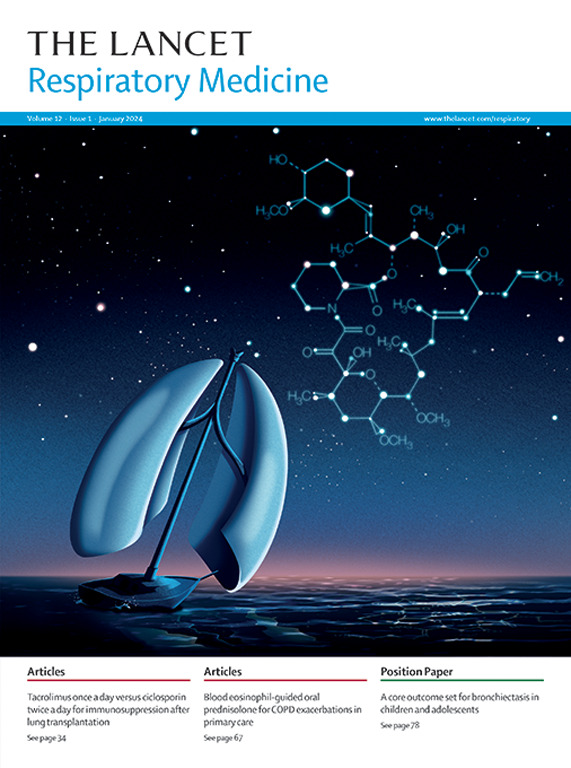Durvalumab, carboplatin, and etoposide in patients who are treatment-naive with extensive-stage small-cell lung cancer and poor performance status (NEJ045A): a single-arm phase 2 trial
IF 32.8
1区 医学
Q1 CRITICAL CARE MEDICINE
引用次数: 0
Abstract
Background
Treating patients with extensive-stage small-cell lung cancer (SCLC) with poor performance status poses considerable challenges. We aimed to evaluate the combination of an immune checkpoint inhibitor with platinum-based therapy in this population.Methods
This open-label, single-arm phase 2 NEJ045A trial enrolled untreated patients with extensive-stage SCLC with performance status 2 or 3. Participants received four cycles of durvalumab, carboplatin, and etoposide, followed by durvalumab maintenance. A dose adjustment strategy was used, with initial reductions in carboplatin–etoposide dosages, subsequently adjusted based on adverse events, allowing for potential escalation. The primary endpoint was tolerability, assessed by the proportion of patients completing induction therapy. A key secondary endpoint was 1-year survival rate. This trial is registered at the Japan Registry of Clinical Trials (jRCTs031200319) and has been completed.Findings
Between April 8, 2021, and Oct 3, 2023, 57 patients (performance status 2 n=43 and performance status 3 n=14) were enrolled with a median age of 73·5 years (IQR 69·0–77·5), 44 (79%) of 56 were male. 26 (67%; 80% CI 55·2–76·7; p<0·0001) of 39 patients with performance status 2 and five (50%; 26·7–73·3; p=0·0088) of ten with performance status 3 completed induction therapy, exceeding the pre-specified threshold. Grade 3 or higher adverse events occurred in 52 (93%) of 56 patients, and 12 (21%) of 56 discontinued due to adverse events. The 1-year survival rates were 43·4% (80% CI 34·1–53·1) overall (p<0·0001), 50·0% (39·1–60·9) in performance status 2 (p<0·0001), and 18·2% (5·0–41·5) in performance status 3.Interpretation
Durvalumab, carboplatin, and etoposide showed tolerability and promising efficacy as a first-line treatment for patients with untreated extensive-stage SCLC with poor performance status, supporting the integration of immune checkpoint inhibitors in this therapeutically challenging population.Funding
AstraZeneca KK.Durvalumab、卡铂和依托泊苷在未接受治疗的广泛期小细胞肺癌和不良状态患者中的应用(NEJ045A):一项单臂2期试验
背景:治疗表现不佳的广泛期小细胞肺癌(SCLC)患者面临相当大的挑战。我们的目的是评估免疫检查点抑制剂与铂基治疗在这一人群中的联合应用。方法:这项开放标签、单臂2期NEJ045A试验纳入了未治疗的、表现状态为2或3的大分期SCLC患者。参与者接受了四个周期的杜伐单抗、卡铂和依托泊苷,随后是杜伐单抗维持。采用剂量调整策略,最初减少卡铂-依托泊苷剂量,随后根据不良事件进行调整,允许潜在的升级。主要终点是耐受性,通过完成诱导治疗的患者比例来评估。一个关键的次要终点是1年生存率。该试验已在日本临床试验登记处注册(jRCTs031200319),并已完成。结果:在2021年4月8日至2023年10月3日期间,纳入57例患者(表现状态2 n=43,表现状态3 n=14),中位年龄73.5岁(IQR 69·0 ~ 77.5),56例患者中有44例(79%)为男性。表现状态2的39例患者中有26例(67%;80% CI为55.2 ~ 77.6;p< 0.0001)完成诱导治疗,表现状态3的10例患者中有5例(50%;26.7 ~ 73.3;p= 0.0088)完成诱导治疗,超过预设阈值。56例患者中有52例(93%)发生了3级或以上不良事件,56例患者中有12例(21%)因不良事件停药。总体(p< 0.0001)的1年生存率为43.4% (80% CI 34.1 - 53.1),性能状态2 (p< 0.0001)的1年生存率为50.0%(39.1 - 60.9),性能状态3 (p< 0.0001)的1年生存率为18.2%(5.0 - 41.5)。杜伐单抗、卡铂和依托泊苷作为治疗状态不佳的未经治疗的大阶段SCLC患者的一线治疗显示出耐受性和有希望的疗效,支持免疫检查点抑制剂在这一治疗挑战性人群中的整合。FundingAstraZeneca KK。
本文章由计算机程序翻译,如有差异,请以英文原文为准。
求助全文
约1分钟内获得全文
求助全文
来源期刊

Lancet Respiratory Medicine
RESPIRATORY SYSTEM-RESPIRATORY SYSTEM
CiteScore
87.10
自引率
0.70%
发文量
572
期刊介绍:
The Lancet Respiratory Medicine is a renowned journal specializing in respiratory medicine and critical care. Our publication features original research that aims to advocate for change or shed light on clinical practices in the field. Additionally, we provide informative reviews on various topics related to respiratory medicine and critical care, ensuring a comprehensive coverage of the subject.
The journal covers a wide range of topics including but not limited to asthma, acute respiratory distress syndrome (ARDS), chronic obstructive pulmonary disease (COPD), tobacco control, intensive care medicine, lung cancer, cystic fibrosis, pneumonia, sarcoidosis, sepsis, mesothelioma, sleep medicine, thoracic and reconstructive surgery, tuberculosis, palliative medicine, influenza, pulmonary hypertension, pulmonary vascular disease, and respiratory infections. By encompassing such a broad spectrum of subjects, we strive to address the diverse needs and interests of our readership.
 求助内容:
求助内容: 应助结果提醒方式:
应助结果提醒方式:


